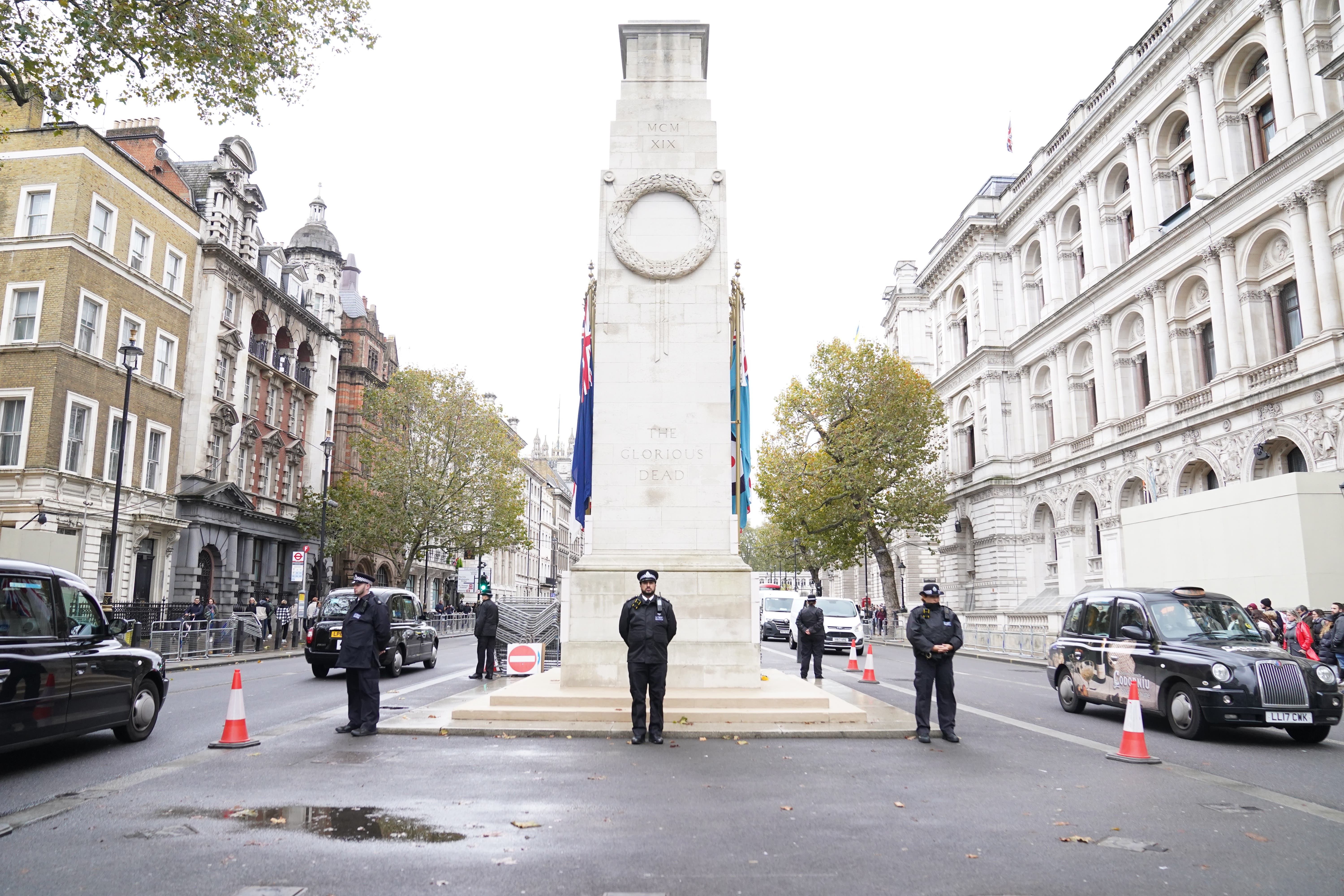Major policing operation as capital braces for Armistice Day pro-Palestine march
Rishi Sunak issued a plea for ‘unity’ amid tensions over the protest.

Your support helps us to tell the story
From reproductive rights to climate change to Big Tech, The Independent is on the ground when the story is developing. Whether it's investigating the financials of Elon Musk's pro-Trump PAC or producing our latest documentary, 'The A Word', which shines a light on the American women fighting for reproductive rights, we know how important it is to parse out the facts from the messaging.
At such a critical moment in US history, we need reporters on the ground. Your donation allows us to keep sending journalists to speak to both sides of the story.
The Independent is trusted by Americans across the entire political spectrum. And unlike many other quality news outlets, we choose not to lock Americans out of our reporting and analysis with paywalls. We believe quality journalism should be available to everyone, paid for by those who can afford it.
Your support makes all the difference.Police are braced for hundreds of thousands of people descending on the capital for what is expected to be one of the largest political marches in British history on Saturday.
Prime Minister Rishi Sunak issued a plea for “unity” amid tensions over a pro-Palestinian march set to go ahead on the day the UK marks the end of the First World War.
There are concerns about the risk of counter-protests, particularly around the Cenotaph, even though the demonstration is not intended to go near the monument.
Scotland Yard will deploy nearly 2,000 officers across central London in a major policing operation over the weekend.
On the eve of the mass protest, the Prime Minister urged those taking part to do so “respectfully and peacefully” and to respect Armistice Day commemorations.
“This act of remembrance is fundamental to who we are as a country and I want to reassure those wishing to pay their respects, attend services and travel that they can and should do so,” Mr Sunak said in a statement.
“It is because of those who fought for this country and for the freedom we cherish that those who wish to protest can do so, but they must do so respectfully and peacefully.
“Remembrance weekend is sacred for us all and should be a moment of unity, of our shared British values and of solemn reflection.”
Home Secretary Suella Braverman remains under pressure from all sides after accusing the police of bias when they resisted pressure to ban the pro-Palestinian march.
After her comments were widely criticised and sparked calls for Mr Sunak to sack her, Mrs Braverman on Friday expressed her “full backing” for the Metropolitan Police at a meeting with Commissioner Sir Mark Rowley.
The officer in charge of policing London during Saturday’s protest told the PA news agency that the force has been “clear” on how it polices protests.
Deputy Assistant Commissioner Laurence Taylor said: “Our job is to ensure that we police without fear or favour, that we balance the rights of everybody, be that protesters, counter-protesters, or people living or coming into London.
“And our job this weekend is to ensure that people are kept safe, and that is what my focus is on.”
More than 100 arrests for offences including supporting proscribed organisations and serious hate crime have been made over the last four major Palestinian protests, according to the Met Police.
Mr Taylor said that it will be a “very difficult weekend for policing”.
“We have got a significant march taking place,” he said.
“We are aware there will be counter-protests, as well as a lot of people who would ordinarily come to London to mark their respect on Armistice Day, on Remembrance Sunday.
“That means we need a large and robust policing plan in place.”
The number of officers on duty in London will be double the usual amount, with 1,850 officers on Saturday and 1,375 on Sunday.
An exclusion zone will be put in place using metal barriers covering Whitehall, Horse Guards Parade, the Westminster Abbey Field of Remembrance and other relevant areas, to prevent those on the march from entering the locations.
The Cenotaph will also have a dedicated 24-hour police presence which will remain in place until the conclusion of Remembrance events on Sunday.
The Met said the march and all speeches must end at 5pm, and a Section 60 and 60AA power will be in place covering Westminster and parts of Wandsworth and Lambeth between 10am on Saturday and 1am on Sunday.
This provides officers with additional powers to search anyone in the area for weapons, and requires people in the area to remove face coverings that are believed to be concealing their identity.
A dispersal zone will be in place covering key central London locations including Trafalgar Square and Piccadilly Circus.
Protests planned at a number of London train stations have also been banned, with orders in place prohibiting trespassory assembly at Waterloo, Victoria and Charing Cross between 10am and 11pm on Saturday.
The planned route for the pro-Palestinian march – expected to be the biggest since the Israel-Hamas conflict erupted on October 7 – goes from Hyde Park to the US embassy in Vauxhall.
The Festival of Remembrance at the Royal Albert Hall, which will be attended by the King and Queen and other members of the royal family, will take place on Saturday.
Remembrance Sunday events will take place at the Cenotaph in Whitehall the following day.
Mrs Braverman is expected to take part in the service, amid speculation at Westminster that she could soon be moved by Mr Sunak in a ministerial reshuffle.
Mr Sunak continued to have confidence in her, Downing Street said on Friday, while it was still internally investigating the “details” of how her inflammatory article was published unaltered despite changes requested by No 10.